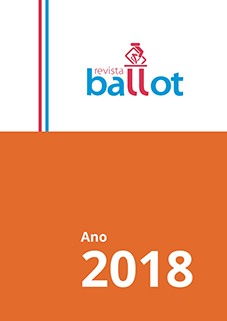Resumo
O presente artigo tem a finalidade de analisar a inconstitucionali.dade da redação da minineforma eleitoral, de forma mais específica e objetiva, o conflito entre o art. 4° da Lei 13.165/2015, que incluiu os parágrafos 3° e 4° no artigo 224 da Lei 4.737/1965, Código Eleitoral, em confronto com o artigo 81, § l º da Constituição Federal. O conflito suscita que o mandamento constitucional determina que havendo vacância de Presidente da República e seu vice, em mais da metade do mandato, ocorrerá eleições indiretas. Na mudança infraconstitucional, determina que haja eleições diretas, desde que a vacância ocorra até 180 dias do término do mandato. A Procuradoria Geral da República e o Partido Social Democrático (PSD) ajuizaram Ação Direta de Inconstitucionalidade e o Partido Trabalhista Nacional ajuizou Arguição de Descumprimento Preceito Fundamental, no Supremo Tribunal Federal. Financiamento das Eleições.Os Direitos Autorais dos trabalhos publicados na revista BALLOT continuam pertencendo aos seus autores, que autorizam, ao inscrever-se no processo de submissão, a divulgação do seu conteúdo nesta plataforma para o acesso livre pela internet, devendo sempre ser citada a fonte. Pessoas interessadas em reproduzir parcialmente os artigos desta revista (partes do texto que excedam a 500 palavras, tabelas e ilustrações) deverão ter permissão escrita do(s) autor (es).
A Revista Ballot obedece aos termos da licença Creative Commons 4.0 (http://creativecommons.org/licenses/by-nc-nd/4.0/), atribuição não comercial e sem derivações, em consonância com a legislação autoral brasileira, Lei 9.610/98.

Este trabalho está licenciado com uma Licença Creative Commons - Atribuição-NãoComercial-SemDerivações 4.0 Internacional.
Downloads
Não há dados estatísticos.

